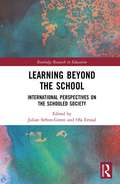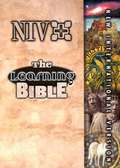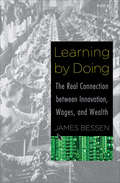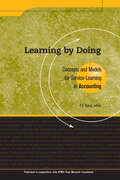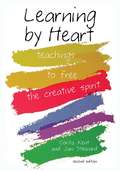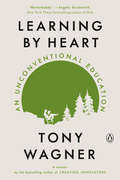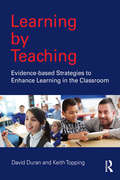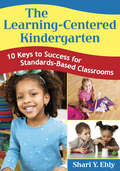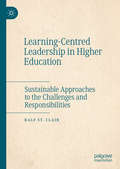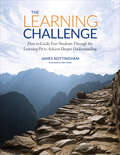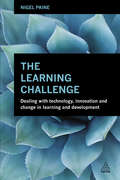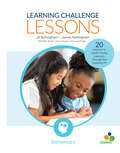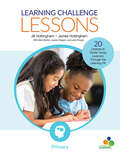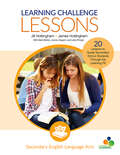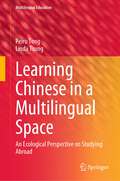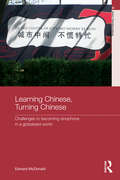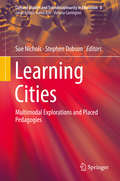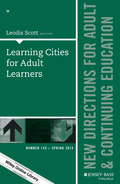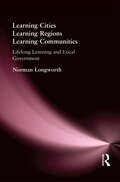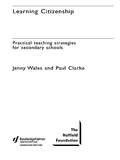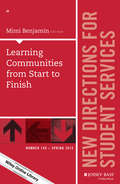- Table View
- List View
Learning Beyond the School: International Perspectives on the Schooled Society (Routledge Research in Education)
by Julian Sefton-Green Ola ErstadWhilst learning is central to most understandings of what it is to be human, we now live in a knowledge society where being educated defines life chances more than ever before. Learning Beyond the School brings together accounts of learning from around the world in organisations, spaces and places that are schooled, but not school. Exploring examples of learning organisation, pedagogisation, informal learning and social education, the book shows not only how understandings of education are framed in terms of local versions of schooling, but what being educated could and should mean in very different social and political contexts. With contributions from scholars based in Australia, Europe, the USA, Latin America and Asia, the book brings together accounts of learning outside of school. Chapters contain rich and detailed case studies of innovative projects, new kinds of learning institutions, youth, peer-driven and community-based activities and public pedagogies, as well as engaging with the dimensions of an argument about the place and nature of learning outside of the school. It challenges dominant versions of school around the world, whilst also critically discussing the value and place of non-institutionalised learning. Learning Beyond the School should be of interest to academics, researchers, postgraduate scholars engaged in the study of comparative education, youth work, education systems, digital culture, sociology of education and youth development. It should also be essential reading for practitioners and policymakers who are interested in youth and education system reform.
The Learning Bible (New International Version)
by American Bible SocietySince the publication of "The Learning Bible"--a full-color, easy-to-use and fun-to-read study Bible--the American Bible Society has been working on an NIV version, which is available this spring. With hundreds of charts, maps, and full-color photos and illustrations, this new Bible is sure to be a bestseller.
Learning by Doing: The Real Connection between Innovation, Wages, and Wealth
by James Bessen&“Bessen sets out to refute the arguments of . . . techno-pessimists, relying on economic analysis and on a fresh reading of history&” (The Wall Street Journal). Technology is constantly changing our world, leading to more efficient production. But where once technological advancements dramatically increased wages, the median wage has remained stagnant over the past three decades. Many of today&’s machines have taken over the work of humans, destroying old jobs while increasing profits for business owners and raising the possibility of ever-widening economic inequality. Here, economist and software company founder James Bessen discusses why these remarkable advances have, so far, benefited only a select few. He argues the need for unique policies to develop the knowledge and skills necessary to implement rapidly evolving technologies. Currently, this technical knowledge is mostly unstandardized and difficult to acquire, learned through job experience rather than in classrooms, but labor markets rarely provide strong incentives for learning on the job. Basing his analysis on intensive research into economic history as well as today&’s labor markets, Bessen explores why the benefits of technology can take decades to emerge. Although the right policies can hasten the process, policy has moved in the wrong direction, protecting politically influential interests to the detriment of emerging technologies and broadly shared prosperity. This is a thoughtful look at what leaders need to do to ensure success not only for the next quarter, but for society in the long term. &“Everyone agrees that education is the key to wage growth. But what kind of education? . . . This enlightening and insightful book . . . shows that economic history can provide some useful and surprising answers.&” —Hal Varian, chief economist at Google
Learning By Doing: Concepts and Models for Service-Learning in Accounting
by D. V. Rama Edward ZlotkowskiThe fifth volume in a AAHE and Campus Compact’s series on service-learning in the disciplines, this volume focuses on curriculum reform in accounting programs based on goals identified by accounting educators and describes specific implementations across the accounting curriculum. A practical guide with real solutions for both accounting educators and students.
Learning by Heart: Teachings to Free the Creative Spirit
by Corita Kent Jan StewardTap into your natural ability to create!* Engaging, proven exercises for developing creativity* Priceless resource for teachers, artists, actors, everyoneArtist and educator Corita Kent inspired generations of artists, and the truth of her words "We can all talk, we can all write, and if the blocks are removed, we can all draw and paint and make things" still shines through. This revised edition of her classic work Learning by Heart features a new foreword and a chart of curriculum standards. Kent's original projects and exercises, developed through more than 30 years as an art teacher and richly illustrated with 300 thought-provoking images, are as inspiring and as freeing today as they were during her lifetime. Learn how to challenge fears, be open to new directions, recognize connections between objects and ideas, and much more in this remarkable, indispensable guide to freeing the creative spirit within all of us. With new material by art world heavyweights Susan Friel and Barbara Loste, Learning by Heart brings creative inspiration into the 21st century!
Learning by Heart: An Unconventional Education
by Tony Wagner&“A page turner. With candor and clarity, Tony Wagner tells the story of his remarkable life and, in so doing, tells the story of our education system.&”—Angela Duckworth, Founder and CEO, Character Lab, and New York Times bestselling author of GritOne of the world's top experts on education delivers an uplifting memoir on his own personal failures and successes as he sought to become a good learner and teacher.Tony Wagner is an eminent education specialist: he has taught at every grade level from high school through graduate school; worked at Harvard; done significant work for the Bill & Melinda Gates Foundation; and speaks across the country and all over the world. But before he found his success, Wagner was kicked out of middle school, expelled from high school, and dropped out of two colleges. Learning by Heart is his powerful account of his years as a student and teacher. After struggling in both roles, he learned to create meaningful learning experiences despite the constraints of conventional schooling--initially for himself and then for his students--based on understanding each student's real interests and strengthening his or her intrinsic motivations. Wagner's story sheds light on critical issues facing parents and educators today, and reminds us that trial and error, resilience, and respect for the individual, are at the very heart of all teaching and learning.
Learning by Teaching: Evidence-based Strategies to Enhance Learning in the Classroom
by David Duran Keith ToppingThis book provides an essential overview of "learning by teaching", unpacking the underpinning theory, research evidence and practical implications of peer learning in a variety of classroom contexts. It aims to offer practical guidance for practitioners in structuring effective peer learning – between professionals and between students alike. It locates this phenomenon in current conceptions of learning and teaching, far removed from traditional ideas of one-way transmission of knowledge. Exactly what happens to promote learning by teaching is explored. Examples of learning by teaching are discussed and it is noted that this happens in school, university and the workplace, as well as through the Internet. Learning by teaching within the student body is then explored, and many different methods described. The organizational features needed to improve learning by teaching consciously and deliberately are investigated. These can be before teaching, during teaching or after teaching. Evidence-based practical guidance is given. Of course teachers can deploy learning by teaching for themselves, but what if they also organize their students to teach each other, thereby giving many more opportunities to discuss, practise, explain and question? This takes pedagogical advantage of the differences between students – turning classrooms into communities of learners where students learn both from their teacher and from their peers.
The Learning-Centered Kindergarten: 10 Keys to Success for Standards-Based Classrooms
by Shari Y. EhlyThis innovative book helps kindergarten teachers align learning-centered practices with state standards and offers classroom vignettes, practical strategies, lesson plans, and other essential resources.
Learning-Centred Leadership in Higher Education: Sustainable Approaches to the Challenges and Responsibilities
by Ralf St. ClairThis book explores the implications of focusing learning in university leadership. While a range of external and internal factors push contemporary higher education leaders towards a reactive and transactional style, the author argues that placing learning at the centre of the decision-making process ultimately grounds higher education leadership in values. Illustrated by numerous case studies and informed by Peter Senge’s theory of learning, the author examines this central thesis across a variety of areas and functions of higher education that are vital to the development and success of this shared endeavour. This book will be of interest and value to both new and established university leaders, as well as scholars of leadership in higher education more generally.
The Learning Challenge: How to Guide Your Students Through the Learning Pit to Achieve Deeper Understanding (Corwin Teaching Essentials)
by James A. NottinghamEmbrace challenge and celebrate Eureka! Challenge makes learning more interesting. That’s one of the reasons to encourage your students to dive into the learning pit—a state of cognitive conflict that forces students to think more deeply, critically, and strategically until they discover their “eureka” moment. Nottingham, an internationally known author and consultant, will show you how to promote challenge, dialogue, and a growth mindset through: Practical strategies that guide students through the four stages of the Learning Challenge Engaging lesson plan ideas and classroom activities Inspiring examples from Learning Challenges across the world
The Learning Challenge: How to Guide Your Students Through the Learning Pit to Achieve Deeper Understanding (Corwin Teaching Essentials)
by James A. NottinghamEmbrace challenge and celebrate Eureka! Challenge makes learning more interesting. That’s one of the reasons to encourage your students to dive into the learning pit—a state of cognitive conflict that forces students to think more deeply, critically, and strategically until they discover their “eureka” moment. Nottingham, an internationally known author and consultant, will show you how to promote challenge, dialogue, and a growth mindset through: Practical strategies that guide students through the four stages of the Learning Challenge Engaging lesson plan ideas and classroom activities Inspiring examples from Learning Challenges across the world
The Learning Challenge
by Nigel PaineThe landscape of workplace learning is transforming. Organizations today understand that formal training is not always the best solution in the fast changing world of innovation and new technology. The rise of social and informal learning, gamification of training, dealing with big data and working with extended enterprise are just some challenges L&D professionals face in their work today. The Learning Challenge helps practitioners to make sense of the latest developments in this area and the impact they have on the learning function in their organization. With the help of case studies and interviews from a range of high profile practitioners, The Learning Challenge defines the role the new learning leader and illuminates the practical implications for creating and implementing a learning strategy for the 21st century.
Learning Challenge Lessons, Elementary: 20 Lessons to Guide Young Learners Through the Learning Pit (Corwin Teaching Essentials Ser.)
by Jill Nottingham James NottinghamJumpstart meaningful learning for students with new Learning Challenge lessons Twenty new lessons, created to accompany The Learning Challenge, provide teachers with everything needed to run thoughtful, dialogue-driven challenges for elementary school students. Each compelling and developmentally-appropriate lesson invites young students to think, to be reasonable, to make moral decisions, and to understand another person’s point of view—all critical skills in today’s complex world. Detailed lesson plans help teachers facilitate rigorous discussion around topics of current importance and include activities and techniques that encourage students into the “Learning Pit” to explore ideas and uncertainties with others through dialogue.
Learning Challenge Lessons, Elementary: 20 Lessons to Guide Young Learners Through the Learning Pit (Corwin Teaching Essentials Ser.)
by Jill Nottingham James NottinghamJumpstart meaningful learning for students with new Learning Challenge lessons Twenty new lessons, created to accompany The Learning Challenge, provide teachers with everything needed to run thoughtful, dialogue-driven challenges for elementary school students. Each compelling and developmentally-appropriate lesson invites young students to think, to be reasonable, to make moral decisions, and to understand another person’s point of view—all critical skills in today’s complex world. Detailed lesson plans help teachers facilitate rigorous discussion around topics of current importance and include activities and techniques that encourage students into the “Learning Pit” to explore ideas and uncertainties with others through dialogue.
Learning Challenge Lessons, Primary: 20 Lessons to Guide Young Learners Through the Learning Pit (Corwin Teaching Essentials)
by James A. Nottingham Jill NottinghamThe Learning Challenge Lessons have been created to accompany The Learning Challenge and provide teachers with everything they need to run thoughtful, dialogue-driven Challenges. The Learning Challenge Lessons, Primary, book includes 20 developmentally-appropriate lesson plans that will help young learners: • Learn new vocabulary in the context of dialogue • Challenge themselves to think through complex concepts • Encourage their natural curiosity and seek answers to questions they pose themselves
Learning Challenge Lessons, Primary: 20 Lessons to Guide Young Learners Through the Learning Pit (Corwin Teaching Essentials)
by James A. Nottingham Jill NottinghamCognitive conflict: Cognitive conflict is created when contradictions are identified and options are examined. It is the disagreement between two or more of the ideas or opinions a person holds concurrently. It is this conflict, or ‘wobble,’ that causes more reflection and the questioning of assumptions.Concepts: These are general ideas that group things together according to accepted characteristics.Construct: This is shorthand for Stage 3 of the Learning Challenge in which participants construct meaning by connecting, explaining, and examining patterns and relationships.Cumulative talk: This is talk that is characterised by repetitions, confirmations, and elaborations.Dialogue: Dialogue is conversation and enquiry. Dialogue combines the sociability of conversation with the skills of framing questions and constructing answers.Discussion: It is the action or process of talking about something and exchanging ideas.Disputational talk: This is talk that is critical of individuals (and their ideas), focuses on differences, is competitive, and is all about being seen to ‘win.’Enquiry: Enquiry is a process of questioning ideas, information, and assumptions and of augmenting knowledge, resolving doubt, or solving a problem.Eureka: Taken from the Greek word for ‘I found it,’ the eureka moment is reached as students climb out of the pit with a new sense of clarity and understanding.Exploratory talk: It is talk that is characterised by longer exchanges, use of questions, reflection, explanation, and speculation.Initiate-Response-Evaluate (IRE) model: Teachers use this most common pattern of classroom talk to ensure that pupils remember what they already know. This is not what we mean by dialogue.Knowledge: Knowledge is acquaintance with facts, truths, or principles. It is generally considered to be a step removed from understanding, which is when someone is able to relate, explain, and evaluate.Metacognition: Literally meaning ‘thinking about thinking,’ metacognition is an important part of dialogue. It encourages students to think about the way in which they are thinking, how they are using the strategies, and how they might improve for next time.Pit: This is a metaphor to identify the state of confusion a person feels when holding two or more conflicting thoughts or opinions in their mind at the same time.Reflection: This is giving serious thought or consideration to a thought, idea, or response.Skills: Skills are the abilities to carry out those processes necessary for gaining understanding, completing tasks or performing in any given context.Success criteria: Success criteria summarise the key steps or ingredients students need to accomplish the learning intention. They include the main things to do, include, or focus on.Understanding: This is the mental process of a person who comprehends. It includes an ability to explain cause, effect, and significance as well as to understand patterns and how they relate to each other.Wobble: This is a user-friendly term to describe a state of cognitive conflict.Zone of proximal development: This model by Lev Vygotsky describes the zone between actual and potential development.
Learning Challenge Lessons, Secondary English Language Arts: 20 Lessons to Guide Students Through the Learning Pit (Corwin Teaching Essentials)
by James A. Nottingham Jill NottinghamFans of the The Learning Challenge who want ready-to-use lessons for their secondary ELA classrooms need not look any further. This book provides teachers with everything they need to run dialogue-driven challenges so that students engage more deeply and develop literary skills critical to ELA standards. Students will analyze texts in lessons grounded in cognitive conflicts such as To be successful you cannot fail, but most successful people have experienced many failures along the way (Lesson 7: Was Jay Gatsby a success?) Love is impossible to define, and yet everyone knows what love is (Lesson 11: Is Romeo really in love?)
Learning Challenge Lessons, Secondary English Language Arts: 20 Lessons to Guide Students Through the Learning Pit (Corwin Teaching Essentials)
by James A. Nottingham Jill NottinghamFans of the The Learning Challenge who want ready-to-use lessons for their secondary ELA classrooms need not look any further. This book provides teachers with everything they need to run dialogue-driven challenges so that students engage more deeply and develop literary skills critical to ELA standards. Students will analyze texts in lessons grounded in cognitive conflicts such as To be successful you cannot fail, but most successful people have experienced many failures along the way (Lesson 7: Was Jay Gatsby a success?) Love is impossible to define, and yet everyone knows what love is (Lesson 11: Is Romeo really in love?)
Learning Chinese in a Multilingual Space: An Ecological Perspective on Studying Abroad (Multilingual Education #41)
by Peiru Tong Linda TsungThis book examines the benefits of an Australian in-country study (ICS) in China programme and explores ways to maximise the short-term ICS experience in a multilingual space. The book employs an ecological perspective which has seldom been used to examine the study abroad context. It emphasises the importance of the space itself as an arena of interaction, belonging and power, where conduct and modes of communication are often regulated by political authorities and societal expectations. Specifically, the book focuses on the following: • the extent to which the ICS facilitated interaction in different settings • the way in which interaction during ICS contributed to language learning • the degree in which the interaction during ICS contributed to culture learning and • the role of identity in the learning process in the ICS. The main argument of the book is that while the ICS promoted multilingual learning space for in-class and out-of-class interactions, which further facilitated language and culture learning to a great extent, Australian students’ identities and self-concepts also played a core mediating role throughout individual learning trajectories.
Learning Chinese, Turning Chinese: Challenges to Becoming Sinophone in a Globalised World (Asia's Transformations)
by Edward McDonaldIn this book Edward McDonald takes a fresh look at issues of language in Chinese studies. He takes the viewpoint of the university student of Chinese with the ultimate goal of becoming 'sinophone': that is, developing a fluency and facility at operating in Chinese-language contexts comparable to their own mother tongue. While the entry point for most potential sinophones is the Chinese language classroom, the kinds of "language" and "culture" on offer there are rarely questioned, and the links between the forms of the language and the situations in which they may be used are rarely drawn. The author’s explorations of Chinese studies illustrate the crucial link between becoming sinophone and developing a sinophone identity – learning Chinese and turning Chinese. Including chapters on: relating text to context in learning Chinese the social and political contexts of language learning myths about Chinese characters language reform and nationalism in modern China critical discourse analysis of popular culture ethnicity and identity in language learning. This book will be invaluable for all Chinese language students and teachers, and those with an interest in Chinese linguistics, linguistic anthropology, critical discourse analysis, and language education. Edward McDonald is currently Lecturer in Chinese at the University of Auckland, and has taught Chinese language, music, linguistics and semiotics at universities in Australia, China, and Singapore.
Learning Cities: Multimodal Explorations And Placed Pedagogies (Cultural Studies and Transdisciplinarity in Education #8)
by Stephen Dobson Sue NicholsThis book is an interdisciplinary text exploring the learning and educative potentials of cities and their spaces, including urban and suburban contexts, at all stages of life. Drawing on the insights of researchers from diverse fields, such as education, architecture, history, visual sociology, applied linguistics and sensory studies, this collection of papers develops and demonstrates the connection between experience, in all its dimensions, and informal learning in the city. The chapters discuss various sensory domains of experience, considering visual, embodied, and even sexual dimensions in relation to what and how learning operates, and the contributors reflect on their learning and inquiring experiences in the city, with special reference to topics such as narrativity, ‘race’ and ethnicity, equity, urban literacy, re-generation, participation, representation and oral histories.
Learning Cities for Adult Learners: New Directions for Adult and Continuing Education, Number 145 (J-B ACE Single Issue Adult & Continuing Education)
by Leodis ScottLearning cities call for a connection of adult education to elementary, secondary, and postsecondary institutions along with vocational and corporate workspaces. This volume considers how “learning cities for adult learners” could be created in America that promote lifelong learning and education. Encouraging a widespread approach to educate and learn across disciplines, within communities, and inside the minds of all people, topics covered include: • workplace and organizational learning, • community engagement and service learning, • public libraries and cooperative extension, and • leisure, recreation, and public health education.This is the 145th volume of the Jossey Bass series New Directions for Adult and Continuing Education. Noted for its depth of coverage, it explores issues of common interest to instructors, administrators, counselors, and policymakers in a broad range of education settings, such as colleges and universities, extension programs, businesses, libraries, and museums.
Learning Cities, Learning Regions, Learning Communities: Lifelong Learning and Local Government
by Norman LongworthThis book explores the mental and social landscape of the city of today and tomorrow; the way in which people think, interact, work together, learn and live with and among each other. Written to address the urgent need for a guide to the principles and practices of lifelong learning, the topics covered include: an introduction to the idea of learning cities policies and strategies for the learning city, including examples form around the world how to activate learning, involve stakeholders and encourage citizen participation in a learning city or region. Written by one of the world’s foremost thinkers in the field, this book is highly readable and easily accessible to anyone interested in the issues addressed. Workers in local, regional and national government, academics and students of lifelong learning, in addition to anyone with an interest in the future of cities and communities will find this a truly invaluable resource and guide to a way of thinking that many see as the way to a better tomorrow.
Learning Citizenship: Practical Teaching Strategies for Secondary Schools
by Paul Clarke Jenny WalesThe Citizenship curriculum aims to help young people to participate more fully in society through the development of a range of relevant skills and knowledge. This book shows how a variety of teaching strategies can be used to teach citizenship skills across a range of curriculum subjects as well as in Citizenship lessons themselves. Topics covered include: developing discussion thinking through debate addressing controversial issues investigating citizenship learning through role play working in groups learning with simulations participation. A lively and practical book which will be invaluable to student teachers and their trainers, Citizenship co-ordinators in schools and advisors across the country. It combines issues of pedagogy with real classroom experiences and demonstrates just how students learn from different teaching strategies.
Learning Communities from Start to Finish: New Directions for Student Services, Number 149 (J-B SS Single Issue Student Services)
by Mimi BenjaminWhile the phrase “learning communities” has various definitions, at the heart of all programs is the goal of enhancing the student learning experience in the community of others. This volume provides valuable information about learning communities--from start to finish--including: • historical and theoretical foundations that guide these programs, • structures of learning communities that provide varied opportunities for student participation, with a focus on specific student populations who may benefit from learning community experiences, and • elements of staffing and assessment, as well as an annotated bibliography of recent learning community literature. The authors consider critical elements of learning community programs and offer recommendations and options for faculty and staff who work with, or hope to work with, this particular curricular and cocurricular learning structure.This the 149th volume of this Jossey-Bass higher education quarterly series. An indispensable resource for vice presidents of student affairs, deans of students, student counselors, and other student services professionals, New Directions for Student Services offers guidelines and programs for aiding students in their total development: emotional, social, physical, and intellectual.
